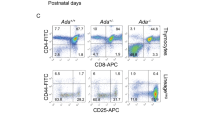Abstract
Adenosine deaminase (ADA) deficiency as a cause of severe combined immunodeficiency (SCID) was first described twenty-five years ago.1 One striking feature of this disease is that although the enzyme is missing in every cell in the body, the immune system is most severely affected. There is an almost complete absence of T cells and a variable decrease in the number of B cells. Gene therapy trials for ADA deficiency are well underway,2,3 and ADA knockout mice have been generated by two groups4,5 as a model to study this disease. Yet even after twenty-five years, the selective lymphotoxicity of ADA deficiency is still not understood. Understanding the mechanism of lymphotoxicity will not only teach us about the pathophysiology of this uncommon disease, but may lend insights into the therapy of this disease and the therapy of other lymphoid developmental defects. It may also give us clues to the design of new therapeutic options for more common lymphoid diseases such as malignancies, and will certainly teach us more about normal lymphocyte development.
Access this chapter
Tax calculation will be finalised at checkout
Purchases are for personal use only
Preview
Unable to display preview. Download preview PDF.
Similar content being viewed by others
References
Hershfield, M. S. and B. S. Mitchell. 1995. Immunodeficiency diseases caused by adenosine deaminase deficiency and purine nucleoside phosphorylase deficiency. In The metabolic and molecular basis of inherited disease. Seventh ed. C.R. Scriver, A.L. Beaudet, W.S. Sly and D. Valle, eds. McGraw-Hill, Inc. New York, p. 1725.
Blaese, R. M., K. W. Culver, A. D. Miller, C. S. Carter, T. Fleisher, M. Clerici, G. Shearer, L. Chang, Y. Chiang, P. Tolstoshev, J. J. Greenblatt, S. A. Rosenberg, H. Klein, M. Berger, C. A. Mullen, W. J. Ramsey, L. Muul, R. A. Morgan, and W. F. Anderson. 1995. T lymphocyte-directed gene therapy for ADA-SCID: initial trial results after 4 years. Science 270: 415.
Bordignon., C., L. D. Notarangelo, N. Nobili, G. Ferrari, G. Casorati, P. Panina, E. Mazzolari, D. Maggioni, C. Rossi, P. Servida, A. G. Ugazio, and F. Mavilio. 1995. Gene therapy in peripheral blood lymphocytes and bone marrow for ADA-immunodeficient patients. Science 270: 470.
Migchielsen, A. A. J., M. L. Breuer, M. A. van Roon, H. te Riele, C. Zurcher, F. Ossendorp, S. Toutain, M. S. Hershfield, A. Berns, and D. Valerio. 1995. Adenosine-deaminase-deficient mice die perinatally and exhibit liver-cell degeneration, atelectasis and small intestinal cell death. Nature Genet. 10: 219.
Wakamiya, M., M. R. Blackburn, R. Jurecic, M. J. McArthur, R. S. Geske, J. J. Cartwright, K. Mitani, S. Vaishnav, J. W. Belmont, R. E. Kellems, M. J. Finegold, C. A. J. Montgomery, A. Bradley, and C. T. Caskey. 1995. Disruption of the adenosine deaminase gene causes hepatocellular impairment and perinatal lethality in mice. Proc. Natl. Acad. Sci. USA 92: 3673.
Jenkinson, E. J. and J. J. T. Owen. 1990. T cell differentiation in thymus organ cultures. Semin. Immunol. 2: 51.
Fox, R. I., L. F. Thompson, and J. R. Huddlestone. 1981. T cells express T-lymphocyte associated antigens. J. Immunol. 126: 2062.
Lalli, E., P. Sassone-Corsi, and R. Ceredig. 1996. Block of T lymphocyte differentiation by activation of the cAMP-dependent signal transduction pathway. EMBO J. 75: 528.
Ullman, B., A. Cohen, and D. W. Martin, Jr. 1976. Characterization of a cell culture model for the study of adenosine deaminase-and purine nucleoside phosphorylase-deficient immunologic disease. Cell 9: 205.
Author information
Authors and Affiliations
Editor information
Editors and Affiliations
Rights and permissions
Copyright information
© 1998 Springer Science+Business Media New York
About this chapter
Cite this chapter
Resta, R., Jiang, H., Hooker, S.W., Laurent, A.B., Thompson, L.F. (1998). Insights into Adenosine Deaminase Deficiency Provided by Murine Fetal Thymic Organ Culture with 2′-Deoxycoformycin. In: Griesmacher, A., Müller, M.M., Chiba, P. (eds) Purine and Pyrimidine Metabolism in Man IX. Advances in Experimental Medicine and Biology, vol 431. Springer, Boston, MA. https://doi.org/10.1007/978-1-4615-5381-6_89
Download citation
DOI: https://doi.org/10.1007/978-1-4615-5381-6_89
Publisher Name: Springer, Boston, MA
Print ISBN: 978-1-4613-7456-5
Online ISBN: 978-1-4615-5381-6
eBook Packages: Springer Book Archive




